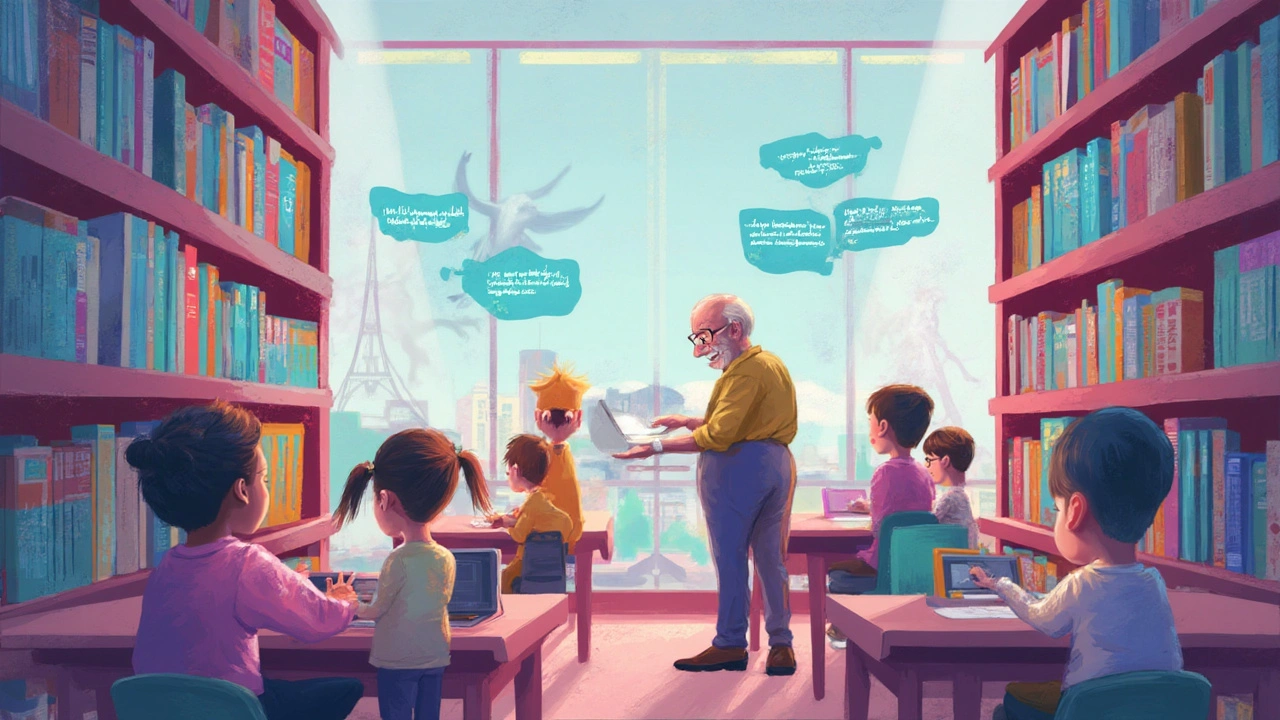Ever wondered why tech giants like Google and Apple rake in billions? It's not just clever marketing or snappy products—it’s the code humming underneath everything. Right now, more folks than ever are picking up programming, and for good reason. You don’t need a computer science degree to change the world anymore. All you need is a laptop, an internet connection, and a blueprint for navigating the digital jungle of modern programming. Stick around, because these next few sections arm you with the secrets, shortcuts, and solid habits you need to thrive. Ready?
Why Programming Matters Right Now
Every day, about 330,000 new malware pieces pop up. Apps handle everything from your dog’s schedule to your heart’s health. Eight-year-olds build games that make adults weep in frustration (you remember Flappy Bird, right?). We’re deep in the digital age—skills aren’t just handy, they’re survival. Whether you’re after better job prospects, want to automate your rental listings, or just love the buzz of solving tricky problems, programming lets you shape the world.
Think about this: As of early 2025, Stack Overflow’s annual survey shows Python is officially the most-loved language for the seventh year running—overtaking JavaScript, which ruled for ages. That’s not just popularity. It’s utility. Python drives machine learning, web development, and even helps fill those endless Excel sheets.
Programming is everywhere because it’s flexible. A mobile app you built for $4.99 could bring in enough to pay your rent. Even supermarket workers use scripts to speed up restocking and ordering. Not only does it pad your bank account, but it also makes you look like a magician to anyone who’s ever struggled with a busted printer.
Let’s face it, coding is now a basic literacy. Maybe not on the level of spelling, but it’s getting there. By 2025, over 500 million apps are projected to exist, and businesses worldwide are begging for developers. Here’s a striking fact: The Bureau of Labor Statistics suggests that in the U.S. alone, software jobs will grow by 22% through 2030—way above average. Even hospitality and retail managers are picking up basic scripting to automate repetitive junk.
Programming is also the new global handshake. A decent GitHub profile is your ticket to freelance gigs in Berlin, remote contracts from Sydney, or startup dreams in Lagos. You don’t have to settle for coffee-fetching internships to break in.
"Everybody in this country should learn to program a computer, because it teaches you how to think." — Steve Jobs, founder of Apple
Programming is also a shortcut to faster results. Remember those days when people spent hours fixing Excel sheets by hand? Now, a Python script can juggle thousands of rows in seconds. And with automation growing in popularity, you don’t just save time—you save sanity.
But it’s not all roses: learning programming can feel like drinking from a firehose. There’s never been so many languages (Python, JavaScript, Go, Rust…), or so many tools (VSCode, Git, Docker). The good news is, you don’t have to learn it all. It’s about picking the right path and using smart learning strategies.
Consider the explosion of community help: Platforms like GitHub, freeCodeCamp, and Codewars have made mentorship and feedback immediate. You’re no longer stuck banging your head against the wall. If you search a programming error, odds are someone in New Delhi, London, or Toronto has answered it—probably with pasted code.
Looking for motivation? Coding isn’t just about building apps. It’s digital problem solving: powering climate data analysis, medical tools that spot diseases sooner, and smart recipes that let you meal prep on a budget. No matter your background, programming lets you leave your fingerprints on the future.

The Must-Know Programming Languages and Tools of 2025
So which languages are worth your time in this avalanche of information? Let’s peel back the hype and look at what’s actually getting used—right now. Here’s what’s hot, useful, and not going anywhere soon:
- Python: Super readable, insanely flexible, and great for beginners. It’s the backbone of machine learning, automation scripts, and backend web apps. Python libraries like Pandas (for data) and Flask (for web servers) have huge communities. NASA uses Python to analyze spacecraft images. That’s cool, right?
- JavaScript: The only language every single browser runs natively. With frameworks like React, Vue, and Svelte, you can build apps that feel lightning-fast on any device. JavaScript is also creeping into backend territory with Node.js.
- TypeScript: JavaScript, but safer. Big companies (think Slack, Airbnb) use this to avoid nasty bugs. Once you get the hang of typing, you’ll wonder how you ever lived without it.
- Go (Golang): Created at Google, Go fills the sweet spot for building fast, scalable cloud services. Docker and Kubernetes (two tools that run most modern servers) are written in Go.
- Rust: Security and speed in a single language—no more memory errors. Firefox and Dropbox both swear by Rust for speed and safety.
You don’t need to be a language hoarder. Here’s a quick decision table to save you headaches:
| Language | Best for | Learning Curve | 2025 Job Relevance |
|---|---|---|---|
| Python | Data Science, Web, Automation | Very Easy | Extremely High |
| JavaScript | Web Frontend/Backend | Moderate | Very High |
| TypeScript | Enterprise Web Apps | Moderate | Growing |
| Go | Backend, Cloud Systems | Easy | High |
| Rust | Systems, Security | Hard | High |
Now, about tools—these can make or break your workflow as much as language choice. The most popular editor in 2025 is Visual Studio Code (VSCode), hands down. Why? It’s fast, free, and the extension marketplace means you can mold it to the way you code.
Version control is non-negotiable. If you aren’t using Git, you’re either stuck in the 1990s or you just started yesterday. Git lets you roll back mistakes, collaborate with strangers, and track every line you touch. Every major project—open source or not—lives on GitHub, GitLab, or Bitbucket.
Curious about workflow? Here’s a quick winning combo:
- Write code in VSCode.
- Keep your code organized and safe with Git.
- Test your ideas without fear of disaster using Docker containers—you can nuke mistakes in seconds.
- Push your best work to GitHub. Invite feedback, showcase to bosses, or land freelance gigs.
Jumping into full-stack development? Learn the basics of HTML, CSS, and then JavaScript. Once you have those down, add a framework (React is still king in 2025) and back it up with Python, Node.js, or Go for your servers.
Don’t sleep on no-code and low-code platforms. Tools like Bubble, Webflow, or Microsoft Power Apps help anyone spin up simple apps in hours—not weeks—just by dragging and dropping. You’ll see MVPs built lightning-fast, letting you focus on what works rather than endless syntax errors.
Here’s a killer tip: Join hackathons. Many are virtual now. You’ll solve real-world problems, pick up habits from more experienced coders, and maybe even get recruited on the spot. In fact, the winner of the 2024 Microsoft Global Hackathon turned a simple Python bot into a $450,000 angel investment.
Feeling stuck? That’s not just you. Every coder whacks their head on the wall sometimes. SearchStackOverflow is basically a rite of passage. Don’t be afraid to Google, copy, and adapt—just don’t forget to understand what you’re pasting. Try shooting for a “30-min frustration rule.” If you can’t figure something out in half an hour, ask someone or search for help—it’ll save you days of stress.
Drowning in resources? Pare it down. Courses at freeCodeCamp or The Odin Project are straight-up gold, and most major universities now post intro programming lectures for free. Don’t buy fancy bootcamps unless you really need hand-holding. Real learning comes from trying, failing, then fixing until you laugh at your first bugs.
The secret sauce in 2025? Combining AI coding assistants with your daily grind. Tools like GitHub Copilot and Replit Ghostwriter suggest code snippets, help fix bugs, and make you feel 10x more productive. But remember, they’re not perfect—trust, but verify.

The Fast-Track Roadmap to Becoming a Pro Coder
If you want to learn programming as fast and painlessly as possible, forget about memorizing thick books. Instead, use the same tricks pros use. Here's the roadmap you actually need:
- Pick One Language and Stick (for Now): Don’t scatter your energy. If you care about web, go JavaScript. Data science? Go Python. Curious about speed? Try Go or Rust, but only if you’re ready for a challenge.
- Focus on Projects, Not Syntax: Syntax gets boring quickly. Crush that boredom by building small useful things. Try an expense tracker, simple game, or even a to-do list app. Don’t just read—do.
- Break Big Problems Into Chunks: No one codes a whole app in one go. Tackle tiny parts and link them together. When you get stuck, Google it or ask ChatGPT—no one cares how you learn, as long as you get there.
- Test Early, Test Often: Bugs are sneaky. Run your code after every little change. One broken line can ruin five hours’ work. Python’s unittest or JavaScript’s Jest let you write quick tests and spot failures before they multiply.
- Use Version Control from Day One: Even if you work alone, use Git. “Commit often, commit early” is the rule. It’ll save you from disaster more times than you can count.
- Read Other People’s Code: Dive into open-source on GitHub. See how pros structure projects, handle mistakes, and name things. The real magic comes not from fresh code, but borrowed wisdom.
- Learn to Read Documentation: The biggest jump in skill comes from understanding docs. Don’t just scan Stack Overflow—dig into the official docs when you feel lost.
- Use Free Learning Platforms: freeCodeCamp, MIT OpenCourseWare, and Codecademy give you hands-on lessons. Follow their step-by-step challenges and build things as you go.
- Ask for Feedback: Join forums, Discord groups, or local meetups. Don’t learn in a bubble. Fresh eyes catch errors you’ll never see.
- Keep a Code Journal: Each time you fix a bug or learn something mind-blowing, jot it down. The best coders are relentless note-takers—they’re never stuck on the same issue twice.
Here’s the dirty secret: It’s completely normal to feel lost, confused, and frustrated when starting out. Ask any seasoned dev about their first year, and you’ll hear stories about missing semicolons and programs that just. Wouldn’t. Run. The misery doesn’t last forever. Stick with it long enough, and you’ll start to pick up patterns—the structure of how things work. And that’s when learning gets addictive.
Check this out: According to Devpost, 62% of participants who finish at least three hackathons in their first year of programming land a tech-related job or freelance gig within six months. Action and immersion beat shallow reading, every time.
Want to stand out? Build a digital footprint. Post your projects on GitHub, share code snippets in blogs, and join big open-source pushes—like Hacktoberfest or Google Summer of Code. Recruiters and team leads always scan GitHub before anything else now.
Set up your workflow with some killer tools:
- VSCode for editing—it’s fast, light, and endlessly customizable.
- Git and GitHub for everyday collaboration.
- Docker for running your code anywhere, safe from your “it works on my machine” curse.
- Code linters like ESLint (JavaScript) or Black (Python) to auto-correct silly mistakes.
- GitHub Copilot for AI-powered suggestions that keep you moving fast—and learning even faster.
Want a shot at landing your first paid gig? Start with building tiny things for local businesses. Offer to automate their booking system or clean up their spreadsheets. Word-of-mouth grows fast. More and more, small and mid-size companies are skipping agencies and going direct to freelance coders.
If you ever feel like you’re not moving fast enough, remember that coding isn’t a sprint—it’s a marathon with lots of shortcuts. Even Google engineers say most of their day is spent troubleshooting and piecing together small improvements, not writing code from scratch. Progress adds up.
Here’s one last tip: Don’t code alone forever. Projects with friends are 10x more fun and teach you real teamwork. Everyone needs debugging buddies.
No matter where you’re starting, the digital age puts endless power at your fingertips. Take that first step: you never know where a few lines of code will take you. Geeky? Maybe. But in 2025, it’s the secret skill that opens doors faster than any diploma. Go for it.

